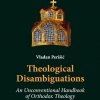“I am now rejoicing in my sufferings for your sake” (Reflections on Colossians 1:24-29)
A Homily at the 6th Annual General Assembly Meeting of the Canonical Orthodox Bishops of the United States of America in Chicago on September 16, 2015
Bishop Maxim (Vasiljevic) of Los Angeles and Western America
In today’s Epistle reading, we see how genuine St Paul’s interest in the Colossians was. He shares with them his joy, his afflictions, and his hopes. His words are so deep in their meaning that it is worthwhile to pay attention to them, so we can see what meaning they have for our own life. Actually, the images and theology he uses here are applicable to the ACOBA’s interest in the Americans.
The apostle of the Gentiles ubiquitously emphasizes the Gospel when preaching Jesus Christ—the Crucified and Resurrected—and says that the mystery of the Gospel is revealed unto him, and that the mystery is the mystery of Christ. This is especially seen in the Letters to the Ephesians and Colossians, but Paul speaks of this in other Letters as well.
1. At the beginning Paul offers an optimistic perspective:
“I am now rejoicing in my sufferings for your sake (Νῦν χαίρω ἐν τοῖς παθήμασιν ὑπὲρ ὑμῶν), and in my flesh I am completing what is lacking in Christ’s afflictions (ἀνταναπληρῶ τὰ ὑστερήματα τῶν θλίψεων τοῦ Χριστοῦ) for the sake of his body, that is, the church.”
Of course, he is not preaching an easy and uncostly spirituality. By using the words “sufferings,” “afflictions,” St Paul wants to say that “Christian spirituality was based on accepting as one’s own the very scandal of the crucified Son of Man, an acceptance that could lead to suffering and death, to martyrdom.”
But, he rejoices at them. Indeed, after Christ’s resurrection, a Christian is rejoicing in his sufferings. Yet, only retrospectively one can evaluate the past in a positive way. All the truths of Christianity are simply reflections or expressions of the dogma of the Resurrection, and from then onward we can understand the overall mystery of existence only in retrospect, as St. Maximus the Confessor emphatically claimed. For St Paul, “humanity’s relation with God is marked by the celebration of this victory over the powers of evil and death.”
The reason of this “completing what is lacking” is—here Paul emphasizes his basic position—“for the sake of his body, that is, the Church”. It is not our purpose here to enter into a detailed discussion of the meaning given by Paul to this image of the body. What exemplifies his theology is the simultaneous use of it for (a) Christ’s personal body, especially in its risen state, (b) the Church as the body of Christ, and (c) the body of Christ as it is broken, shared, and communicated in the Eucharist.
2. From there the Holy Apostle Paul carries on to a really moving reference to the economy of God, as an important dimension of his mission: he is a “servant according to God’s commission” (κατὰ τὴν οἰκονομίαν τοῦ θεοῦ). He is not a self-proclaimed preacher. The purpose of that commission is “to make the word of God fully known.” One might think that the “word of God” is a narrative, rhetoric, and “word”. But St Paul goes beyond and announces that this “word” is “the mystery that has been hidden throughout the ages and generations” (τὸ μυστήριον τὸ ἀποκεκρυμμένον ἀπὸ τῶν αἰώνων καὶ ἀπὸ τῶν γενεῶν). The term “mystery” usually refers to “mystical experience”. The mystics tend to isolate themselves from the ordinary body of the Church. Mystical experience is identified with the extraordinary and the unusual, often with the individual as distinct from or even opposed to the common mass of Christians that make up the Church. But for St Paul and the early Church, “mysterion” (μυστήριον) indicates experiences common to all its members, such as Baptism and the Eucharist, without which no one could be called a member of the Church, whom St Paul, without hesitation, calls “saints”. This mystery “has now been revealed to his saints” (ἐφανερώθη τοῖς ἁγίοις αὐτοῦ), i.e., to the members of the Church.
3. Now, we can ask, who are these “saints”? Usually, in our pastoral manuals sanctity or holiness is limited to “signs,” “miracles,” “moral perfections,” or yoga style calmness. But St Paul answers in a surprising way. God’s saints are those chosen by God “to make known how great among the Gentiles are the riches of the glory of this mystery (οἷς ἠθέλησεν ὁ θεὸς γνωρίσαι τί τὸ πλοῦτος τῆς δόξης τοῦ μυστηρίου τούτου ἐν τοῖς ἔθνεσιν). If you want to be a “saint” you have to humble yourself and rejoice in your sufferings for the sake of the people, completing in your flesh “what is lacking in Christ’s afflictions.”
In other words, this mystery is nothing else but Christ living in Christians, “the hope of glory” (ὅ ἐστιν Χριστὸς ἐν ὑμῖν, ἡ ἐλπὶς τῆς δόξης). The glory of God the Father is His Only-begotten Son among many brethren. “Every aspect of the Gospel demonstrates its equivalence with the Great Mystery of Christ, the Incarnate One. For this mystery is truly manifest not only within Christ, but also as Christ.”
St Paul adds “the hope of glory,” because the Glory of God is precisely the incorporation of all the people in the body of Christ. In this way God is glorified in the world. He is not glorified with our mere words, our individual virtue, but with the body of Christ that is the Church.
4. Therefore, according to St Paul, every proclamation should refer to the person of Christ: “it is he whom we proclaim” (ὃν ἡμεῖς καταγγέλλομεν). In today’s America, a good preacher aims to captivate the individual with psychological appeals. St Paul wants the opposite: to include man into a liberated space-time of the Body of Christ-the Church, where he or she will acquire freedom from all individualistic priorities and become acquainted with the incarnate Logos through communion with the Spirit and in personal freedom and love.
For St Paul, Christ, the Incarnate Logos and Son of God and Son of Man, within Himself encompasses and embraces His own Body, the Church, and we as Christians are members of the Church, members of Christ.
This is conceived pre-eternally and providentially and is manifest in Christ the God-man: we as God-like and Christ-like persons exist and live within the theanthropic communion of the Holy Thrice-hypostatic Trinity.
For the Church, in fact, is the communion of the Holy Trinity: the Grace of Christ, who manifests the goodwill of God the Father, and the pre-eternal Love of God the Father for us, and the Communion of the Holy Spirit (2 Cor. 13:13).
5. And St. Paul continues, my brethren, even further. He does not simply say that we are to receive Christ for ourselves, but “warn everyone and teach everyone”. This is what we are supposed to do: “warning everyone and teaching everyone in all wisdom” (διδάσκοντες πάντα ἄνθρωπον ἐν πάσῃ σοφίᾳ).
The goal is not to simply educate people by instilling knowledge in them but something else: “so that we may present everyone mature in Christ” (ἵνα παραστήσωμεν πάντα ἄνθρωπον τέλειον ἐν Χριστῷ).
But what does this mean? That we individually become mature in Christ? This is not the meaning of becoming mature in Christ.
The goal of the entire argument in this passage is to summarize, in the words of St Maximus the Confessor: “that we are the members and the body of Christ, and that we constitute the fullness of Christ God, who fills all things in every way according to the plan hidden in God the Father before the ages, with the result that we are being recapitulated to Him through His Son and our Lord and God Jesus Christ.”
6. This is the deeper and bigger mystery that happens in the case of the Church, especially in the Holy Eucharist. With this way St Paul wants to show a dimension, which we often forget in the spiritual life, the dimension of our neighbor. In society today, technology is often employed to depersonalize and suppress human dignity. In his book, The Death of the Neighbor, an Italian psychiatrist Luigi Zoja discusses how “technology has killed the second Judeo-Christian commandment: to love thy neighbor like thyself. Because in this technological, mass civilization, we don't care about our neighbors; we don’t even know if our neighbor is dying.”
Whatever, my brethren, takes place during the Divine Liturgy, it must not stop there but must continue into our daily life.
7. To conclude, in view of a true Orthodox ecclesial realism, the genuine mission and task of the Orthodox Church in Americas is twofold in character and is of the utmost significance and substance.
First, the Church must bear witness to the particular ethos of its Orthodox Tradition, and confront the ethos of Western Christendom and its culture, which is based on individualism.
Second, the Church in America must also interpret the so-called “Western” way of thinking for the Orthodox believer. An Orthodox American, who possesses native cultural credibility in his own land and who can therefore act as a bridge between historical Orthodoxy and Western culture, is best able to fulfill this task.
Let us hope that the Faithful will feel the fresh waves of vitality through the episcopal expression of the common voice of the Orthodox Church on the American continent. Our attentiveness toward the existential realities of American life is the condition sine qua non of our authenticity. Only by an empathetic approach to the anxieties, sufferings, and problems of others, i.e., the neighbor of the Gospel, can we effectively bring the theory (theoria) of the new reality of inter-Orthodox relations on this continent to the light of the day.
In doing all this, we can pray with St Paul: “For this I toil and struggle with all the energy that he powerfully inspires within me (εἰς ὃ καὶ κοπιῶ ἀγωνιζόμενος κατὰ τὴν ἐνέργειαν αὐτοῦ τὴν ἐνεργουμένην ἐν ἐμοὶ ἐν δυνάμει).”
May our Triune God of Three Persons in perfect communion bestow the riches of the glory of this mystery salvation to all, leading us to wholeness and to experience of His communal truth in all its fullness.




